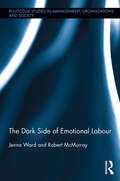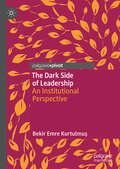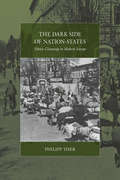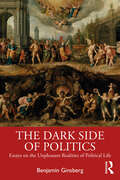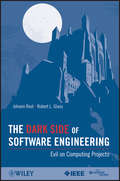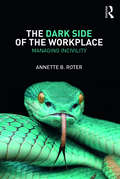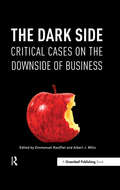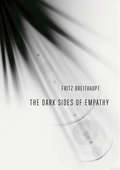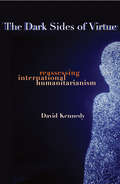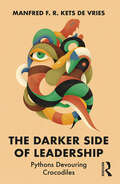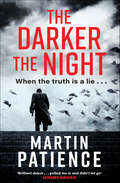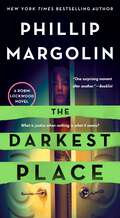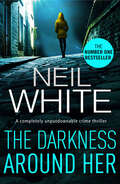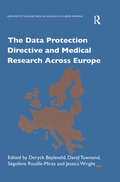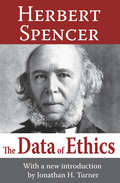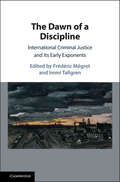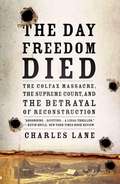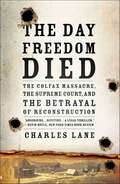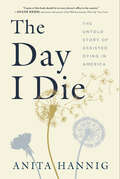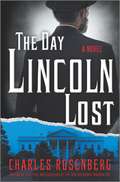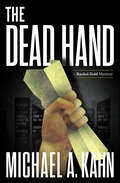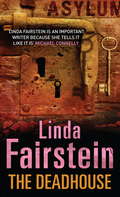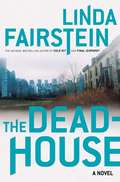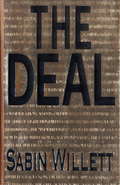- Table View
- List View
The Dark Side of Emotional Labour (Routledge Studies in Management, Organizations and Society)
by Jenna Ward Robert McMurrayThe Dark Side of Emotional Labour explores the work that the rest of society would rather not think about, the often unseen work that is emotionally disturbing, exhausting, upsetting, and stigmatising. This is work that is simultaneously undesirable and rewarding, work whose tasks are eschewed and yet necessary for the effective function of individual organisations and society at large. Diverse and challenging, this book examines how workers such as the doorman, the HR manager, the waiter and the doctor’s receptionist experience verbal aggression and intimidation; how the prison officer and home carer respond to the emotions associated with physical violence, and; how the Samaritan, banker and veterinarian deal in death and despair. It also considers how different individuals develop the emotional capital necessary to cope with the dark side of emotional labour, and how individuals can make sense of, and come to take satisfaction and pride in, such difficult work. Finally, the book considers what is to be done with darker emotional work, both in terms of the management and care of those labouring on the dark side. Challenging and original, this book gives a voice to those who undertake the most demanding work on our behalf. It will be of interest to researchers and students of organisation studies and its related fields, and to every one of us who is called on to work or manage on the Dark Side.
The Dark Side of Leadership: An Institutional Perspective
by Bekir Emre KurtulmuşContrary to the notion that leaders contribute to positive behaviour within organisations, this book reflects growing interest in the ‘dark side’ of leadership: the unethical and immoral personalities that can reside in positions of power. Drawing on empirical and theoretical analysis, the author examines immorality within leadership and the underlying causes behind this behaviour. Focusing on the impact of institutional pressures, this book analyses how such behaviour is influenced by internal and external factors. By employing a theoretical framework, the author seeks to demonstrate that institutions either compel leaders to be ethical and moral, or in contrast, they actually provide legitimacy for immoral actions. An insightful and thought-provoking read, The Dark Side of Leadership will be of interest to those studying leadership, HRM, and business ethics, as well as social psychology scholars.
The Dark Side of Marketing Communications: Critical Marketing Perspectives (Routledge Studies in Critical Marketing)
by Tim Hill Pierre McDonaghWhat fuels capitalism and what stops it from collapsing? Does marketing communications support and sustain the economic and political status quo?This book is not about describing the ways in which businesses can optimize the messages they put across or about adding to the marketing communicator’s toolkit. This book argues that marketing communications plays an increasingly important role in bolstering contemporary capitalism. Drawing on conceptualizations of the ‘market’ from political economy and sociology, it focusses on five logics that underpin and sustain the form of capitalism in which we live: the logic of competition, the logic of sustainability, the logic of individualism, the logic of objectivity, and the logic of distraction. It does this by exploring those arenas which are increasingly dominated by the communicative activities of business: sport, CSR, social media, statistics, and entertainment.Bringing theories from marketing and consumer research, sociology, cultural studies, technology and media studies to bear on marketing communications, this book is necessary reading for undergraduate and postgraduate students and academics who wish to understand the broader role of marketing communications in the reproduction of contemporary capitalism.
The Dark Side of Nation-States: Ethnic Cleansing in Modern Europe
by Philipp TherWhy was there such a far-reaching consensus concerning the utopian goal of national homogeneity in the first half of the twentieth century? Ethnic cleansing is analyzed here as a result of the formation of democratic nation-states, the international order based on them, and European modernity in general. Almost all mass-scale population removals were rationally and precisely organized and carried out in cold blood, with revenge, hatred and other strong emotions playing only a minor role. This book not only considers the majority of population removals which occurred in Eastern Europe, but is also an encompassing, comparative study including Western Europe, interrogating the motivations of Western statesmen and their involvement in large-scale population removals. It also reaches beyond the European continent and considers the reverberations of colonial rule and ethnic cleansing in the former British colonies.
The Dark Side of Politics: Essays on the Unpleasant Realities of Political Life
by Benjamin GinsbergThis series of scholarly chapters explores the unpleasant realities of modern politics – and American politics in particular – by examining how self- interest, war, violence, deception and institutional failure continue to characterize the political landscape. Author Benjamin Ginsberg argues that the political world in which we like to think we live – the world of civic engagement, representative government and principled political discourse – is fleeting and fragile, resting uneasily upon the foundation of a harsh and dark reality. Making a fundamental contribution to our understandings of politics, this book is an important read for students and scholars of American Politics and Government.
The Dark Side of Software Engineering
by Robert L. Glass Johann RostBetrayal! Corruption! Software engineering?Industry experts Johann Rost and Robert L. Glass explore the seamy underbelly of software engineering in this timely report on and analysis of the prevalance of subversion, lying, hacking, and espionage on every level of software project management. Based on the authors' original research and augmented by frank discussion and insights from other well-respected figures, The Dark Side of Software Engineering goes where other management studies fear to tread -- a corporate environment where schedules are fabricated, trust is betrayed, millions of dollars are lost, and there is a serious need for the kind of corrective action that this book ultimately proposes.
The Dark Side of the Workplace: Managing Incivility
by Annette B. RoterThe workplace can be a hotbed of difficulty and incivility—from rumors spread about an individual, to the agonies of stress, to physical attacks and even death. Evidence suggests that not only does incivility have significant implications for employees, organizations and society, it is also on the rise. In recent years we have experienced increased acts of incivility in the workplace, social media and government positions. There is a direct correlation between uncivil behavior and financial outcomes for organizations. It is estimated that stress related to uncivil actions in the workplace costs organizations approximately $300 billion annually. The cost of personal implications for employees is often too high to calculate as individuals experience loss of reputation and significant psychological and physical distress. With the increased use of social media, individuals are experiencing incivility that crosses the boundary between their personal and professional lives. This book delves into the darker side of the workplace, discussing bullying, toxic work environments, corporate psychopaths, the struggles of stress, and more. It combines recent research and case studies to provide an understanding of these behaviors, and offers practical solutions on how to cultivate a healthy working environment.
The Dark Side: Critical Cases on the Downside of Business
by Albert J. Mills Emmanuel RauffletThe discredit of a certain brand of capitalism – and the managers that practice it – continues apace. The increasing lack of tolerance for short-term thinking and a systematic neglect of the social, regulatory, and economic conditions in which business ought to operate means we are entering a time of trouble and questions – an era of economic, social, and environmental turbulence. There is a critical need for business educators and trainers to expose students and managers to these issues to examine, explore, and understand the different multifaceted, complex phenomena of our late capitalist era. There is also a need to foster a climate for future and current business managers to reflect, feel, and think differently both ethically and cognitively. The 16 innovative case studies in The Dark Side: Critical Cases on the Downside of Business are designed for this very purpose: to provoke reflection and debate; to challenge and change perceptions; and to create responsible managers. The cases are innovative in two ways. First, in terms of content they acknowledge the diversity of actors and interests in and around organizations. They contain different levels of analysis, and propose different points of view and logics. They recognize that decisions that seem sound when they are made may actually contain the seeds of their later failure. Second, these cases are innovative in terms of format. Whereas most cases are formatted around decision-making situations, these are more diverse and open-ended. This stimulates the use of "judgment" – the capacity to synthesize, integrate, and balance short- and long-term effects, appreciate effects on different groups, and learn to listen and evaluate. Whereas decision-making is the key skill when confronting complicated issues and situations, "judgment-making" relies on experience and is a far better tool in the complex, murky, gray areas typical of business ethics. The cases included here are all finalists or award-winners from the first seven years of the Dark Side of Business Case Competition, a joint event of the Academy of Management's Critical Management Studies Section and Management Education Section. In many areas of management, case studies are almost exclusively devoted to "best practice" cases or difficult decisions faced by basically well-managed firms. When educators look for resources to illustrate to students the more typical cases, let alone the really scandalous practices of the worst firms, the cupboard is almost entirely bare. From the beginning, the Dark Side competition aimed at encouraging case studies that integrate socio-political issues with organizational dynamics, thus contextualizing organizational and management problems within the broader system of capitalism. These cases comprise a diverse and rich collection from a range of countries, continents, and issues and focus on interactions in business organizations as well as between business organizations and groups and societies. The Dark Side: Critical Cases on the Downside of Business is divided into four sections. The first sheds light on gray areas in the behavior of businesses. The second concerns the interactions between business and local communities in diverse countries. The third concerns crises, and specifically how firms may create or manage them. Finally, the fourth section concerns gray areas in business behavior in the global context. The Dark Side: Critical Cases on the Downside of Business will be an essential purchase for educators and is expected to be a widely used resource at all levels of management education.Online Teaching Notes to accompany each chapter are available on request with the purchase of the book.
The Dark Sides of Empathy
by Fritz BreithauptMany consider empathy to be the basis of moral action. However, the ability to empathize with others is also a prerequisite for deliberate acts of humiliation and cruelty. In The Dark Sides of Empathy, Fritz Breithaupt contends that people often commit atrocities not out of a failure of empathy but rather as a direct consequence of over-identification and a desire to increase empathy. Even well-meaning compassion can have many unintended consequences, such as intensifying conflicts or exploiting others.Empathy plays a central part in a variety of highly problematic behaviors. From mere callousness to terrorism, exploitation to sadism, and emotional vampirism to stalking, empathy all too often motivates and promotes malicious acts. After tracing the development of empathy as an idea in German philosophy, Breithaupt looks at a wide-ranging series of case studies—from Stockholm syndrome to Angela Merkel's refugee policy and from novels of the romantic era to helicopter parents and murderous cheerleader moms—to uncover how narcissism, sadism, and dangerous celebrity obsessions alike find their roots in the quality that, arguably, most makes us human.
The Dark Sides of Virtue: Reassessing International Humanitarianism
by David KennedyIn this provocative and timely book, David Kennedy explores what can go awry when we put our humanitarian yearnings into action on a global scale--and what we can do in response. Rooted in Kennedy's own experience in numerous humanitarian efforts, the book examines campaigns for human rights, refugee protection, economic development, and for humanitarian limits to the conduct of war. It takes us from the jails of Uruguay to the corridors of the United Nations, from the founding of a non-governmental organization dedicated to the liberation of East Timor to work aboard an aircraft carrier in the Persian Gulf. Kennedy shares the satisfactions of international humanitarian engagement--but also the disappointments of a faith betrayed. With humanitarianism's new power comes knowledge that even the most well-intentioned projects can create as many problems as they solve. Kennedy develops a checklist of the unforeseen consequences, blind spots, and biases of humanitarian work--from focusing too much on rules and too little on results to the ambiguities of waging war in the name of human rights. He explores the mix of altruism, self-doubt, self-congratulation, and simple disorientation that accompany efforts to bring humanitarian commitments to foreign settings. Writing for all those who wish that "globalization" could be more humane, Kennedy urges us to think and work more pragmatically. A work of unusual verve, honesty, and insight, this insider's account urges us to embrace the freedom and the responsibility that come with a deeper awareness of the dark sides of humanitarian governance.
The Darker Side of Leadership: Pythons Devouring Crocodiles
by Manfred F. Kets de VriesManfred Kets de Vries is one of the most authoritative voices on organizational dynamics, leadership, executive coaching, and psychotherapy today. In all his roles, he has noticed that questions are now, increasingly, coming back to one thing – the wider state of the world. Using an engaging and highly readable style throughout the book, Manfred helps us to make sense of the confusing and, some might say, psychotic times in which we now live.Revealing the darker side of leadership, Manfred explores the tendency for people to adopt ‘sheeple’ or herd-like behavior, the populist threat that we are facing, the dangers that come with feelings of perceived injustice, the rise of dictatorships, and the impact of Leviathan (neo-authoritarian) leadership behavior. Guided by theoretical concepts, the book provides readers with a better understanding of the underlying forces that drive these phenomena to the surface. What are the psychological dynamics at play? Why do groups of people behave in this manner? Beyond merely diagnosing what’s happening, Manfred introduces various coping strategies to counteract the emergence of these regressive forces.The book offers a unique and original approach to answering the micro- and macro-psychological questions of how to mitigate against populism and autocratic leadership, and will be of interest to the general reader as well as the key audiences of organizational leaders, psychoanalysts, coaches, psychotherapists, sociologists and social psychologists.
The Darker the Night
by Martin PatienceBrilliant debut. The Darker the Night pulled me in from the start and didn’t let go' – Jeremy Bowen, BBC International Editor NPR's Book of the Day A referendum on Scottish independence is only days away, and the campaign has been expertly orchestrated by First Minister Susan Ward. All signs point to victory for the nationalists. But when senior civil servant John Millar is shot in a Glasgow alley on a furiously rain-soaked night, his death triggers a chain of catastrophic events. An incriminating phone number and video are found in his possession. Into this chaos walks reporter Fulton Mackenzie. A man himself blighted by tragedy but also someone used to seeing beneath the surface to find the truth. Who was John Millar? Who wanted him dead? And why? And the biggest question of all – who is trying to alter the future path of an entire nation?
The Darkest Place: A Robin Lockwood Novel (Robin Lockwood #5)
by Phillip MargolinDefense attorney Robin Lockwood faces an unimaginable personal disaster and her greatest professional challenge in the next New York Times bestselling Phillip Margolin's new legal thriller, The Darkest Place.Robin Lockwood is an increasingly prominent defense attorney in the Portland community. A Yale graduate and former MMA fighter, she's becoming known for her string of innovative and successful defense strategies. As a favor to a judge, Robin takes on the pro bono defense of a reprehensible defendant charged with even more reprehensible crimes. But what she doesn't know—what she can't know—is how this one decision, this one case, will wreak complete devastation on her life and plans.As she recovers from those consequences, Robin heads home to her small town of Elk Grove and the bosom of her family. As she tries to recuperate, a unique legal challenge presents itself—Marjorie Loman, a surrogate, is accused of kidnapping the baby she carried for another couple, and assaulting that couple in the process. There's no question that she committed these actions but that's not the same as being guilty of the crime. As Robin works to defend her client, she learns that Marjorie Loman has been hiding under a fake identity and is facing a warrant for her arrest for another, even more serious crime. And buried within the truth may once again be unexpected, deadly consequences.
The Darkness Around Her (Dan Grant and Jayne Brett Series)
by Neil WhiteA lawyer and his investigator must discover why his client accused of a gruesome murder remains silent in this dark legal thriller. One freezing December night, the body of young, vulnerable, Lizzie Barnsley is found on the side of an isolated canal. When blood from her stiletto heel matches that on a wound on the head of Peter Box, police swiftly declare him the prime suspect in her murder. Criminal lawyer, Dan Grant, is called in to provide Peter Box&’s legal defense, along with investigator, Jayne Brett. They need answers from Box—but he&’s not talking. As they dig deeper into the case, they discover that this brutal slaying is just the latest in a series of deaths in the Northern town of Highford, starting with the murder of teenager Rosie Smith a decade ago. Blood spatter linked her stepfather, Sean Martin, to the crime—so why did Peter Box try to claim he&’d killed young Rosie? As the investigation deepens, and more murders along the towpaths come to light – murders that can&’t be linked to Peter Box—Jayne and Dan realize that they have stumbled onto a dark conspiracy in their little town. It&’s clear Peter has something to hide, but is he a killer? Grant and Brett are plunged into a race against time to uncover the truth…before a twisted psychopath claims another victim. Fans of Angela Marsons, Steve Cavanagh, and John Grisham will be hooked until the very last page.Praise for the writing Neil White&“A lively, accurate and absolutely compelling legal thriller; stand-out in both its prose and its plot. The characters are still with me, two days after finishing it. I couldn't put it down.&” —Gillian McAllister, Sunday Times-bestselling author of Everything But the Truth&“One of the best writers of legal thrillers out there.&” —David Jackson, author of Don&’t Make A Sound and A Tapping At My Door
The Data Protection Directive and Medical Research Across Europe (Data Protection and Medical Research in Europe : PRIVIREAL)
by J. Wright D. TownendThe Data Protection and Medical Research in Europe: PRIVIREAL series focuses on the 'Privacy in Research Ethics and Law' EC-funded project examining the implementation of Directive 95/46/EC on data protection in relation to medical research and the role of ethics committees in European countries. The series consists of five separate volumes following the complete development of the PRIVIREAL project. This volume relates to the first stage of the project regarding the implementation of the Data Protection Directive, in particular in the area of medical research. It contains an introduction and overview of this topic, keynote papers addressing specific questions on the subject, and a report on both the general implementation of the Directive and the implementation in relation to medical research in 26 European countries. The book will be invaluable for those people with an interest in data protection, medical research and their implications for each other. It lays open the actual situation across Europe, including both New Member States and Newly Associated Member States.
The Data of Ethics
by Herbert SpencerIn this amazingly prophetic work, done late in his career, Herbert Spencer offers an approach to ethics that anticipates developments throughout the twentieth century. He moves away from the twin evils of ethical doctrines bequeathed to us by an ancient past that are simply no longer feasible but also avoids modern standards of ethical conduct that are simply impossible to attain. "By association with rules that cannot be obeyed," Spencer writes, "rules that can be obeyed lose their authority."The volume opens with three chapters on conduct: its evolution, good and bad, and ways of judgment. This is followed by a series of chapters that examine ethics from a variety of scientific perspectives: physics, biology, psychology, and sociology. The work then moves on to specific issues of deep human concern: the relativity of pleasures and pain, egoism versus altruism in explaining actions, and trial and compromise in decision-making about ethical concerns.Spencer's work anticipates the movement toward pragmatic, naturalistic, and even positivist approaches to ethics. He emphasizes that a relativist approach while in keeping with the spirit of the industrial age, also poses a variety of problems that admit only of empirical solutions. He understands that his critical stance on absolutism should not blind researchers to the ideals assumed by the ancients that assist people in their everyday living. In short, this is a remarkable work, entirely modern, and yet containing a sharp evaluation of how ethical data serve to enhance ethical conduct.
The Dawn of a Discipline: International Criminal Justice and Its Early Exponents
by Frédéric Mégret Immi TallgrenThe history of international criminal justice is often recounted as a series of institutional innovations. But international criminal justice is also the product of intellectual developments made in its infancy. This book examines the contributions of a dozen key figures in the early phase of international criminal justice, focusing principally on the inter-war years up to Nuremberg. Where did these figures come from, what did they have in common, and what is left of their legacy? What did they leave out? How was international criminal justice framed by the concerns of their epoch and what intuitions have passed the test of time? What does it mean to reimagine international criminal justice as emanating from individual intellectual narratives? In interrogating this past in all its complexity one does not only do justice to it; one can recover a sense of the manifold trajectories that international criminal justice could have taken.
The Day Freedom Died: The Colfax Massacre, the Supreme Court, and the Betrayal of Reconstruction
by Charles Lane"Absorbing ... Riveting ... A legal thriller. "--Kevin Boyle, The New York Times Book Review. Following the Civil War, Colfax, Louisiana, was a town like many where African Americans and whites mingled uneasily. On April 13, 1873, a small army of white ex-Confederate soldiers, enraged after attempts by freedmen to assert their new rights, killed more than sixty African Americans who had occupied a courthouse. Seeking justice for the slain, one brave U. S. attorney, James Beckwith, risked his life and career to investigate and punish the perpetrators--but they all went free. What followed was a series of courtroom dramas that culminated at the Supreme Court, where the justices' verdict compromised the victories of the Civil War and left Southern blacks at the mercy of violent whites for generations. The Day Freedom Died is a riveting historical saga that captures a gallery of characters from presidents to townspeople, and re-creates the bloody days of Reconstruction, when the often brutal struggle for equality moved from the battlefield into communities across the nation.
The Day Freedom Died: The Colfax Massacre, the Supreme Court, and the Betrayal of Reconstruction
by Charles LaneThe untold story of the massacre of a Southern town’s freedmen and a white lawyer’s battle to bring the killers to justice: “Riveting.” —The New York Times Book ReviewFollowing the Civil War, Colfax, Louisiana, was a town, like many, where African Americans and whites mingled uneasily. But on April 13, 1873, a small army of white ex–Confederate soldiers, enraged after attempts by freedmen to assert their new rights, killed more than sixty African Americans who had occupied a courthouse. With skill and tenacity, the Washington Post’s Charles Lane transforms this nearly forgotten incident into a riveting historical saga.Seeking justice for the slain, one brave US attorney, James Beckwith, risked his life and career to investigate and punish the perpetrators—but they all went free. What followed was a series of courtroom dramas that culminated at the Supreme Court, where the justices’ verdict compromised the victories of the Civil War and left Southern blacks at the mercy of violent whites for generations. The Day Freedom Died is an electrifying piece of historical detective work that captures a gallery of characters from presidents to townspeople, and re-creates the bloody days of Reconstruction, when the often-brutal struggle for equality moved from the battlefield into communities across the nation.“Thoroughly readable, carefully documented.” —Publishers Weekly (starred review)“Fascinating.” —New Orleans Times-Picayune“An electrifying piece of historical reporting.” —Tucson Citizen
The Day I Die: The Untold Story of Assisted Dying in America
by Anita HannigAn intimate investigation of assisted dying in America and what it means to determine the end of our lives.In this groundbreaking book, award-winning cultural anthropologist Anita Hannig brings us into the lives of ordinary Americans who go to extraordinary lengths to set the terms of their own death. Faced with a terminal diagnosis and unbearable suffering, they decide to seek medical assistance in dying—a legal option now available to one in five Americans.Drawing on five years of research on the frontlines of assisted dying, Hannig unearths the uniquely personal narratives masked by a polarized national debate. Among them are Ken, an irreverent ninety-year-old blues musician who invites his family to his death, dons his best clothes, and goes out singing; Derianna, a retired nurse and midwife who treks through Oregon and Washington to guide dying patients across life's threshold; and Bruce, a scrappy activist with Parkinson's disease who fights to expand access to the law, not knowing he would soon, in an unexpected twist of fate, become eligible himself.Lyrical and lucid, sensitive but never sentimental, The Day I Die tackles one of the most urgent social issues of our time: how to restore dignity and meaning to the dying process in the age of high-tech medicine. Meticulously researched and compassionately rendered, the book exposes the tight legal restrictions, frustrating barriers to access, and corrosive cultural stigma that can undermine someone's quest for an assisted death—and why they persist in achieving the departure they desire.The Day I Die will transform the way we think about agency and closure in the face of death. Its colorful characters remind us what we all stand to gain when we confront the hard—and yet ultimately liberating—truth of our mortality.
The Day Lincoln Lost
by Charles RosenbergAn inventive historical thriller that reimagines the tumultuous presidential election of 1860, capturing the people desperately trying to hold the nation together—and those trying to crack it apart.Abby Kelley Foster arrived in Springfield, Illinois, with the fate of the nation on her mind. Her fame as an abolitionist speaker had spread west and she knew that her first speech in the city would make headlines. One of the residents reading those headlines would be none other than the likely next president of the United States.Abraham Lincoln, lawyer and presidential candidate, knew his chances of winning were good. All he had to do was stay above the fray of the slavery debate and appear the voice of reason until the people cast their votes. The last thing he needed was a fiery abolitionist appearing in town. When her speech sparks violence, leading to her arrest and a high-profile trial, he suspects that his political rivals have conspired against him.President James Buchanan is one such rival. As his term ends and his political power crumbles, he gathers his advisers at the White House to make one last move that might derail Lincoln’s campaign, steal the election and throw America into chaos.A fascinating historical novel and fast-paced political thriller of a nation on the cusp of civil war, The Day Lincoln Lost offers an unexpected window into one of the most consequential elections in our country’s history.
The Dead Hand: A Rachel Gold Mystery (Attorney Rachel Gold Mysteries #10)
by Michael A. KahnSt Louis lawyer Rachel Gold deals with many a family drama, mostly of the dysfunctional variety. Divorce. Paternity. And death. Occasionally, all three combine into a "dead hand" trifecta, where the deceased seeks to control the living—and especially his descendants—from beyond the grave.Rachel calls them "zombies." The legal term for such inheritance plans is "the dead hand," the English translation of the Old French term "mortmain." The term refers to the attempt by wealthy individuals to exert perpetual ownership over property (and future generations) through legal documents prepared before they die. But not even the most obsessed tycoon or his skilled attorneys can foresee every future contingency. To quote the old Yiddish maxim, "Man plans, and God laughs." And angry descendants sue.It's so true. Rachel suddenly finds herself representing two women—one a young widow, one an older divorcee—in a pair of nasty zombie cases where the outcome of each hinges upon a clause in a contested estate plan.Client Cyndi Mulligan is the trophy widow of the late Bert Mulligan, a billionaire entrepreneur whose last will and testament left his estate to Cyndi's unborn daughter. The challenge comes from Bert's angry first wife and her angrier only son. Their claim: Cyndi's daughter—born eleven months after Bert's death—cannot possibly be Bert's child.In the other case, Rachel represents Marsha Knight, the first wife of the wealthy founder of a women's lingerie manufacturer. Marsha has been sued by his young widow, who seeks to invalidate Marsha's divorce settlement and, in the process, impoverish her through invocation of the ancient and nearly inscrutable Rule Against Perpetuities.As the trial date approaches in each lawsuit, the threats to Rachel and her two clients begin to escalate. Zombies, as Rachel discovers, are hard to kill. And even worse, they can still kill—and where least expected.The Dead Hand is written with the verve, humor, and legal smarts that are trademark Michael Kahn.
The Deadhouse (Alexandra Cooper #4)
by Linda FairsteinLola Dakota had to call in the police several times to restrain her abusive husband, but he always returned, so when they got wind of his plan to hire a hitman to kill her she agrees to play her part in the sting which would see both men arrested. It proves to be a great success, but several hours later and when her husband is under lock and key, Lola is truly dead -and by someone's hand. The police team on the original sting are in disarray, so Alex Cooper and Mike Chapman are swiftly in place to take over. Looking beyond her husband into her professional life, they discover a university department riddled with jealousies, extra-marital affairs, swindled funds and the unexplained disappearance of a student known to be a drug user. The one thing which seems to link all the players with all the misdemeanours is the university's research site on an island off Manhattan where they were investigating the remains of the Victorian isolation hospitals and lunatic asylums and the morgue - the deadhouse. But why Lola's murder is connected to the place is not so easy to prove, nor the identity of her killer.
The Deadhouse: A Novel (An Alexandra Cooper Novel #4)
by Linda FairsteinAssistant D.A. Alexandra Cooper returns in this page-turning New York Times bestseller from legendary Manhattan sex-crimes prosecutor Linda Fairstein.On Roosevelt Island, a strip of land in New York City's East River, stands an abandoned 19th century smallpox asylum, "The Deadhouse," where the afflicted were shipped off to die. It's a gruesome bit of history perhaps best forgotten. But for Alexandra Cooper, it may be the key to a shocking murder that cuts deeper than the arctic cold front gripping the city. A respected university professor is dead -- strangled and dumped in an elevator shaft. And while the school does damage control for anxious parents, Cooper and her close detective friend Mike Chapman scramble for answers, fueled by the most daunting discovery: a piece of paper, found on the lifeless body of Professor Lola Dakota, that reads The Deadhouse....
The Deal
by Sabin WillettAt 7:00 am in a Boston boardroom, there's a disaster in the making. High in an office tower in the heart of the financial district, lawyers and bankers are fighting a deadline to close an $840,000,000 leveraged buyout. Under the pressure of the crowded agenda, no one notices that a zero has been dropped from the mortgage document. The papers are signed, cheers and applause roar from the boardroom--and the fuse of a time bomb is lit. When it explodes, there will be hell to pay. As the partners of Freer, Motley, the presiding law firm, will discover, they are collectively and personally liable to their client to make up the multimillion-dollar shortfall.And so begins an accelerating and dire chain of events. Freer, Motley's senior partner is found dead, and its brightest young associate is charged with murder. The firm needs a fall guy, and John Shepard, brilliant but arrogant--and recently passed over for partner--fills the role to perfection. Defending John Shepard in a Boston court is going to be a career buster. No one wants the job, and no one understands why Ed Mulcahy accepts the case, even if he is Shepard's friend--but they don't know that he's already in way too deep to walk away.On a par with Scott Turow's Presumed Innocent, The Deal is the most exciting new legal thriller from a first-time author to be published in years. Written by a young partner with one of Boston's prestigious old firms, it is an utterly authentic view of the city's judicial system, from the ex-con informants, paid for their evidence, to the district attorney who needs a conviction for the sake of his political career. It is also the compelling story of two young lawyers--a defendant and his attorney--realizing too late that they are up against an old-guard establishment more powerful than they could ever imagined.
